For this family battling son’s rare disorder, ‘new normal’ has a different meaning
The “new normal” we’ve all become familiar with in 2020 has an entirely different meaning for the Moores, a Charlotte family that has been tirelessly battling their 17-month-old son’s rare and incurable disorder for more than a year.
In early August 2019, months before the COVID-19 pandemic threw into sharp relief the life-altering effects of disease, Kristen and Douglas Moore were grappling with their 7-week-old son Jackson’s diagnosis of tuberous sclerosis complex (TSC).
Tuberous sclerosis is a rare genetic disorder that causes tumors to grow in the brain – often leading to seizures and developmental delay – as well as other vital organs. As in the Moores’ case, two-thirds of the cases are “spontaneous,” or new genetic mutations in a family where the disease wasn’t present before. Many, like Jackson, have epilepsy and other conditions such as autism.
In an effort to combat Jackson’s TSC, the Moore family recently arrived at Texas Children’s Hospital in Houston to undergo testing and possibly surgery to try to reduce his seizures – a common effect of TSC – and help his development, which has been stalled by the disorder. CharlotteFive spoke with the Moores about their journey with Jackson’s TSC and hopes for the future.
‘Even though we had an answer, we had no answer’
The Moores found out they were expecting their first child in fall 2018. The pregnancy was normal, and Jackson was born two weeks early on June 19, 2019.
“When he was born, I remember them handing him to me,” Kristen said. “He looked into my eyes – I just remember locking eyes with him. He had these beautiful eyes, blue and hazel. I remember him looking me straight in the eyes.”
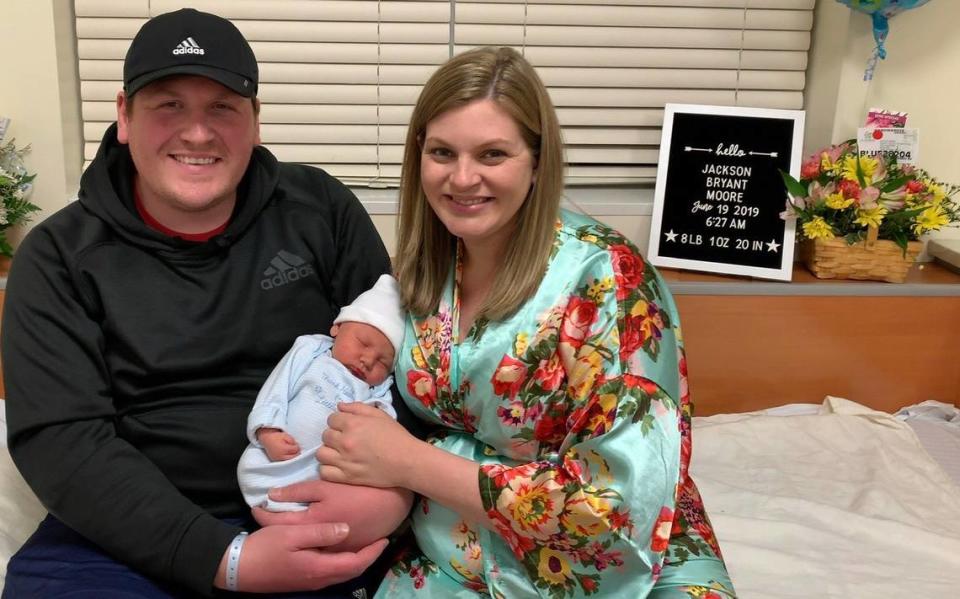
The Moores were full of hope as they brought Jackson back to his nursery — decorated white with elephants, the mascot of the Moores’ alma mater in Alabama — in their first home at The Park at Oaklawn, across the street from Camp North End, which they’d purchased the year before. They had paid off their student loans. They were settled into great jobs. They were ready to start a family.
“I used to rock Jackson and just stare at him or sit on the back patio with him in the early mornings,” Kristen said. “There was so much excitement about what his future could be.”
The first seven weeks of his life were as normal as the pregnancy — a normalcy both parents now long for. There were the sleepless nights and the difficulty adjusting to parenthood.
Both Moores said they’d do anything to go back to the long nights and — yes, normal — stresses of those first days of new parenthood. The lack of sleep. The difficulty adjusting to parenthood.
“All the things we would complain about those early days – the things all new parents complain about – we would take it all back,” Douglas said.
Not even two months later, normal would be over for this family.
On Aug. 8, 2019, they were getting Jackson ready for a bath when Douglas noticed something strange: Jackson’s left arm shook in an abnormal way. The next morning, they noticed the same movements. After being advised that the movements could be seizures, the Moores took Jackson to the ER.
Around 10 a.m. on Aug. 10, following a long night full of scans and tests, a neurologist handed the Moores a piece of paper and told them the diagnosis: Jackson had TSC and epilepsy. In that moment, everything began to change.
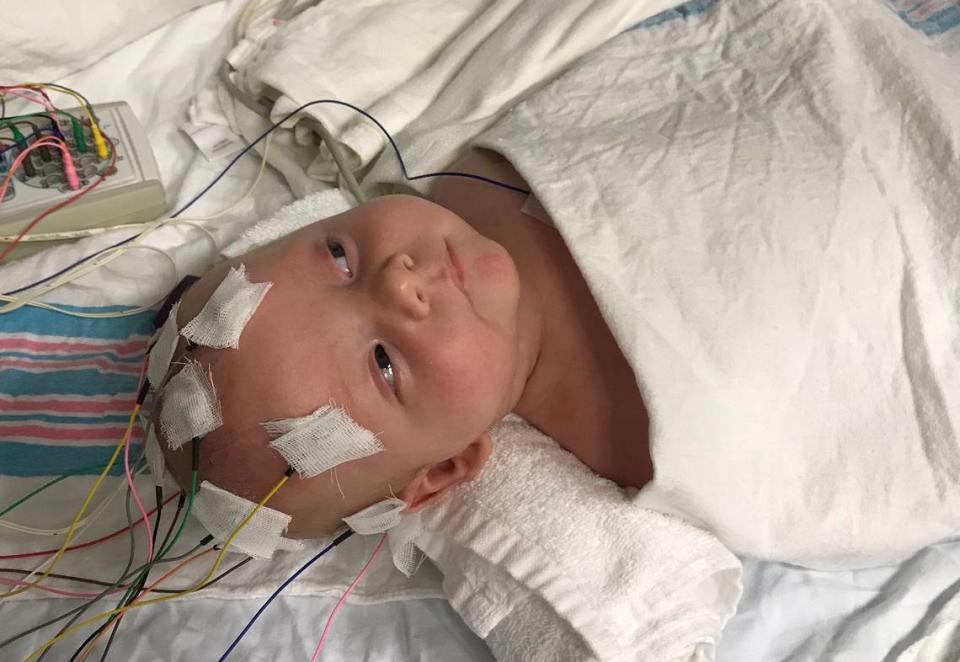
“After the diagnosis, I remember just wishing I could go back to the sleepless nights and the things that now seem so simple,” Kristen said.
Subsequent testing revealed benign tumors in Jackson’s brain had caused the seizures. Another tumor was found on the back of his left eye. Skin lesions have developed on his face and neck, he has cysts on his kidneys and spleen, and he faces other health issues. He has undergone many hospital and specialists visits, EEG tests, MRIs and other tests.
“At first, we thought, OK, get us the medicine and we’ll go home,” Kristen said. “And then they said, ‘There’s no cure.’ … Even though we had an answer, we had no answer.”
‘We’ve been figuring out our own new normal for longer’
For the Moores, the “new normal” has amounted to a maze of medical documents, doctors’ appointments, financial strain and emotional distress. In January, Kristen decided to leave her job as a senior public relations manager that she’d held for seven years to focus entirely on helping Jackson.
Douglas works full time as a senior engineering consultant at a tech consulting firm at home during the day while Kristen takes care of Jackson. In the evening, Douglas takes over caring for Jackson while Kristen shifts to freelancing for several companies and managing logistics for Jackson’s TSC.
“People are talking about this ‘new normal’ with COVID, but we’ve been figuring out our own new normal for longer,” Kristen said. “We’re doing everything we can, but we just don’t know what’s going to happen.

“My life is managing his medical documents, medications, appointments, everything,” Kristen continued. “That drives our life.”
And while they don’t have the typical support base of family nearby – her family is in Georgia and his lives in Alabama – their community has filled the gap. Friends have held fundraisers, made meals and cleaned up for them. Even a hug meant the world to them.
“It feels like ongoing grief,” Douglas said. “We were grieving for months. … Sometimes I feel OK about it. Sometimes I’ll be upset. And sometimes I’ll be in denial.”
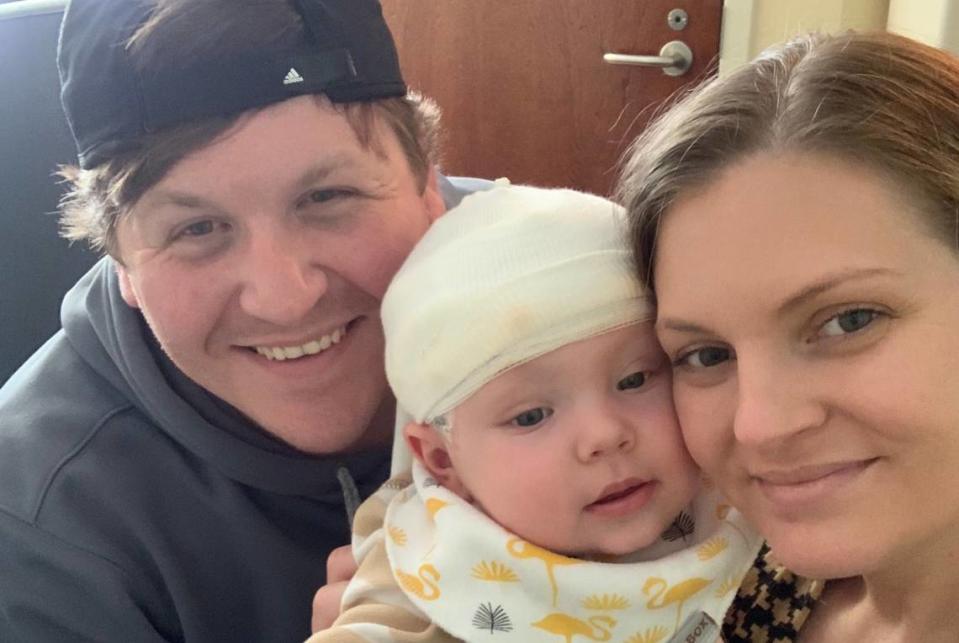
“Parents have said how it’s like PTSD but different – it’s ongoing traumatic stress disorder,” Kristen said. “We’re scared about the surgery. Someone touching his head is terrifying. But we also feel hopeful.”
Seeking a cure through community
Navigating an incurable, mercurial disorder like TSC quickly proved to be a challenge not only logistically but also psychologically. How do you create a path forward with a disorder that looks different in every case and has no cure?
That’s where the TS Alliance comes in. The alliance is an organization dedicated not only to finding a cure for TSC but also improving the lives of people affected by the disorder, which affects roughly every one in 6,000 births, said Steven Roberds, chief scientific officer at the Tuberous Sclerosis Alliance.
The alliance works to bring the community together to connect with peers who understand their situation, Roberds said.
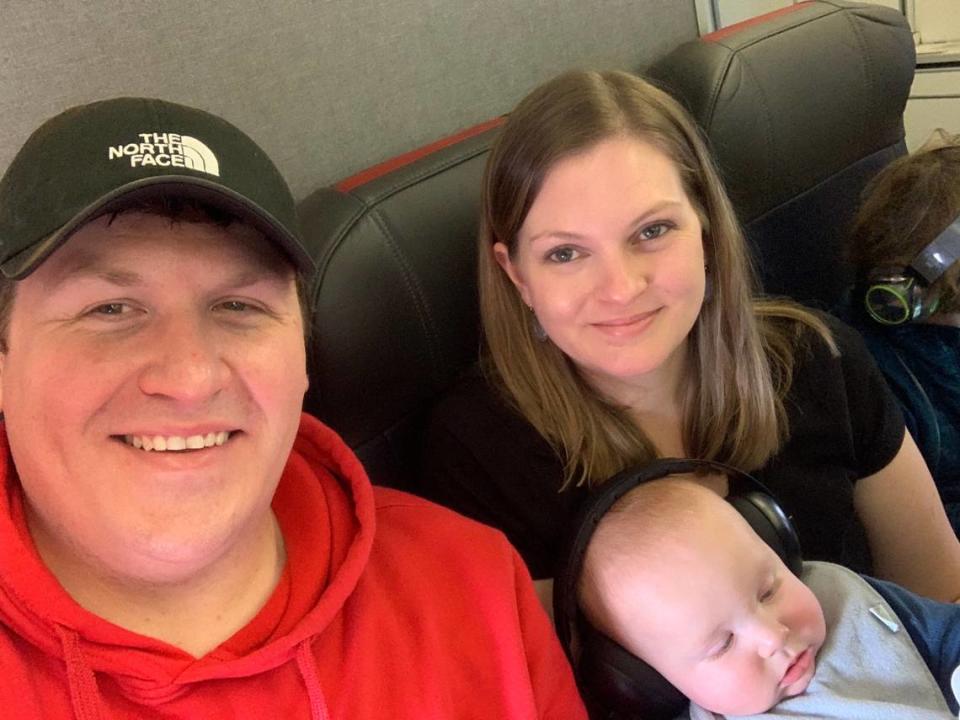
“An important part is listening to the community, understanding which aspects of the disease are most impactful to their lives and then driving and catalysing research to those points,” he said.
The organization collaborates in research partnerships, supports TSC community members and educates on the disorder, among many other activities.
“It’s very strategic — we try to tackle it from different sides,” Roberds said. “But we also know the alliance can’t solve the problems ourselves. We don’t have enough money or staff or time. We try to be a catalyst. We try to bring people together. We work on alliances and partnerships. … If we are incorporating these alliances and the community – that’s where I feel we play a critical role.”
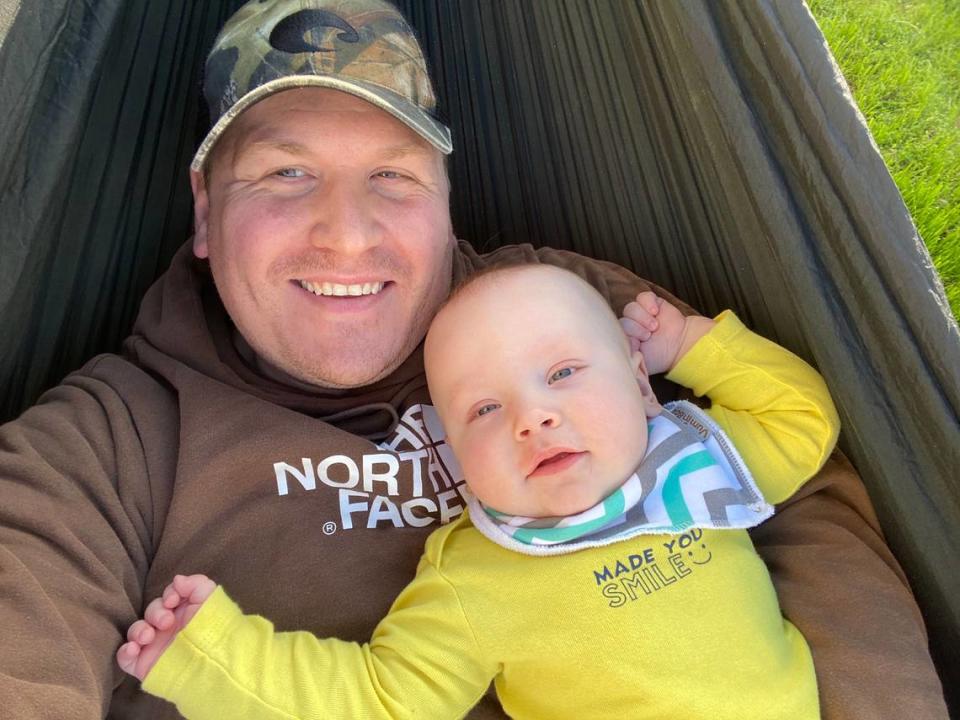
Roberts said the TS Alliance’s goal of a “cure” is making TSC a chronic but livable disease. Once people are able to control life-threatening aspects of the disorder (say, take a medication and go about life) that’s when the work toward the ultimate goal – a cure – can start.
‘Embrace what you have’
As families throughout Charlotte were settling in on Thanksgiving week plans (or lack of plans, due to COVID-19), the Moores were traveling to Houston in an effort to fight the TSC disorder’s hold on their son. They will remain in Texas through December to support Jackson’s intensive tests and a possible surgery to either reduce Jackson’s seizures or improve his development.
Roberds said families taking such a step so early on is key to helping development. He also said it’s a courageous move.
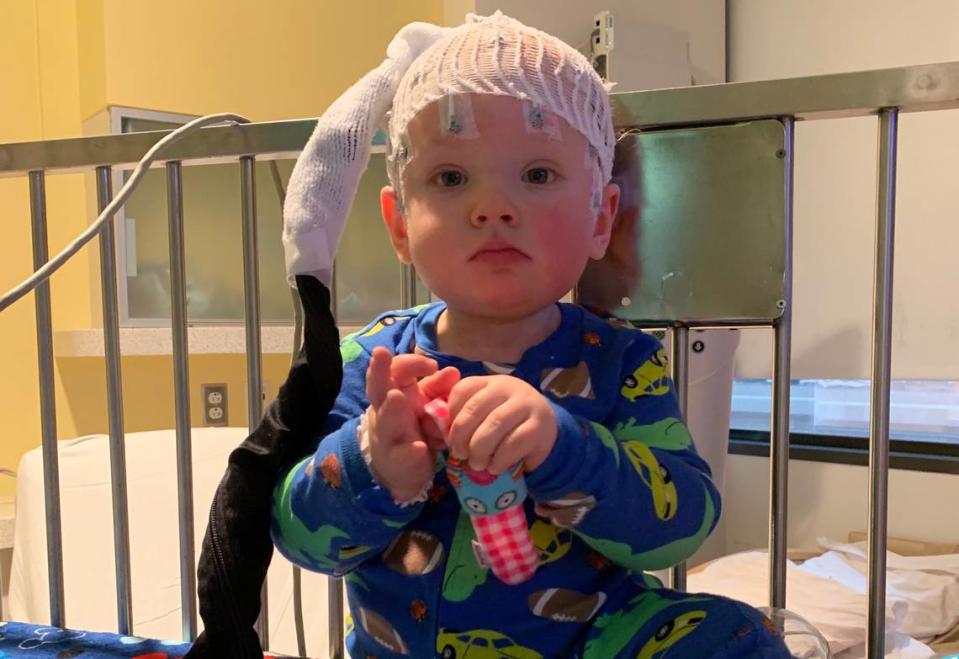
Additionally, Jackson has been working with Shawn Leis, owner of Little Feet Pediatric Therapy and a physical therapist since January. Leis said she’s noticed progression in Jackson’s development.
“In January, when we started, he was not rolling – he couldn’t sit up on his own,” Leis said. “Those are all things a child his age should have been able to do. He started crawling right after his first birthday. Now he’s crawling all over the place – all around their apartment.”
Leis said she observed a direct correlation between Jackson having more seizures and him not developing as quickly. Over time, she noticed how his brain-body connection has improved.
“With this surgery he’s undergoing, we’ll hope that will open that brain-body passage more,” she said.

“As a parent, you feel like you have to protect your child – I feel that especially as a father,” Douglas said. “You want to always be there for them. But there’s no way I can fully provide that – I’ll never understand what he’s going through. I have to find things to connect with him. Sometimes I ask myself, ‘What did I do to cause this?’”
“I know that’s not the right pattern of thinking,” Douglas continued. “We got some great advice once. They told us no to get too much into the diagnosis and celebrate the nice things you do have. Embrace what you have.”
Get our newsletter
Sign up now to get CharlotteFive in your inbox daily.

